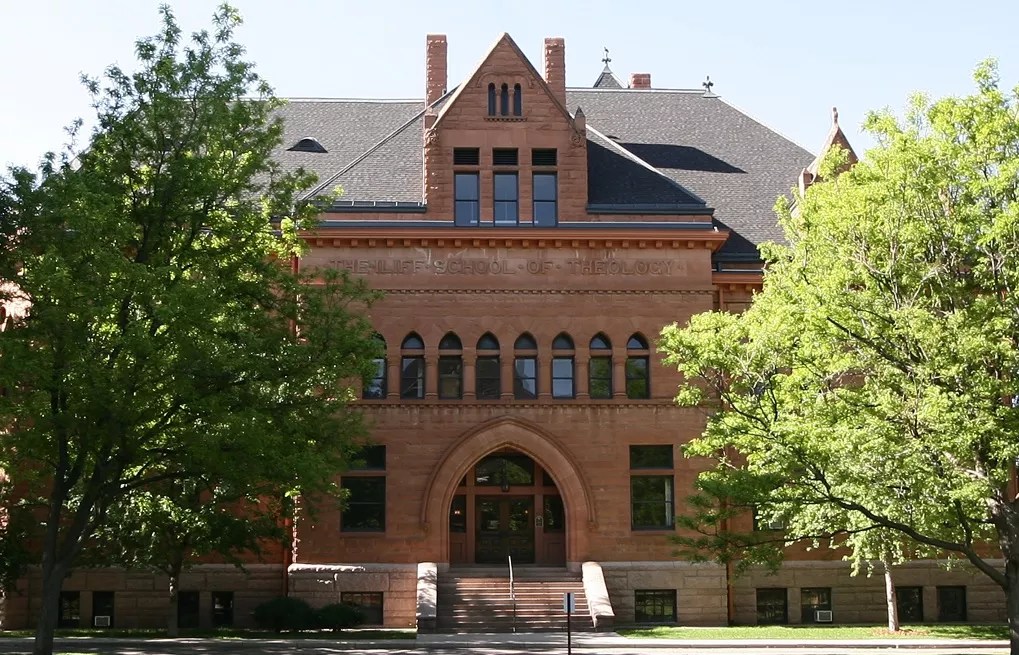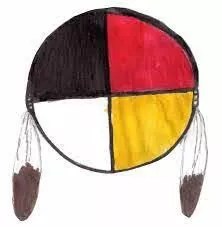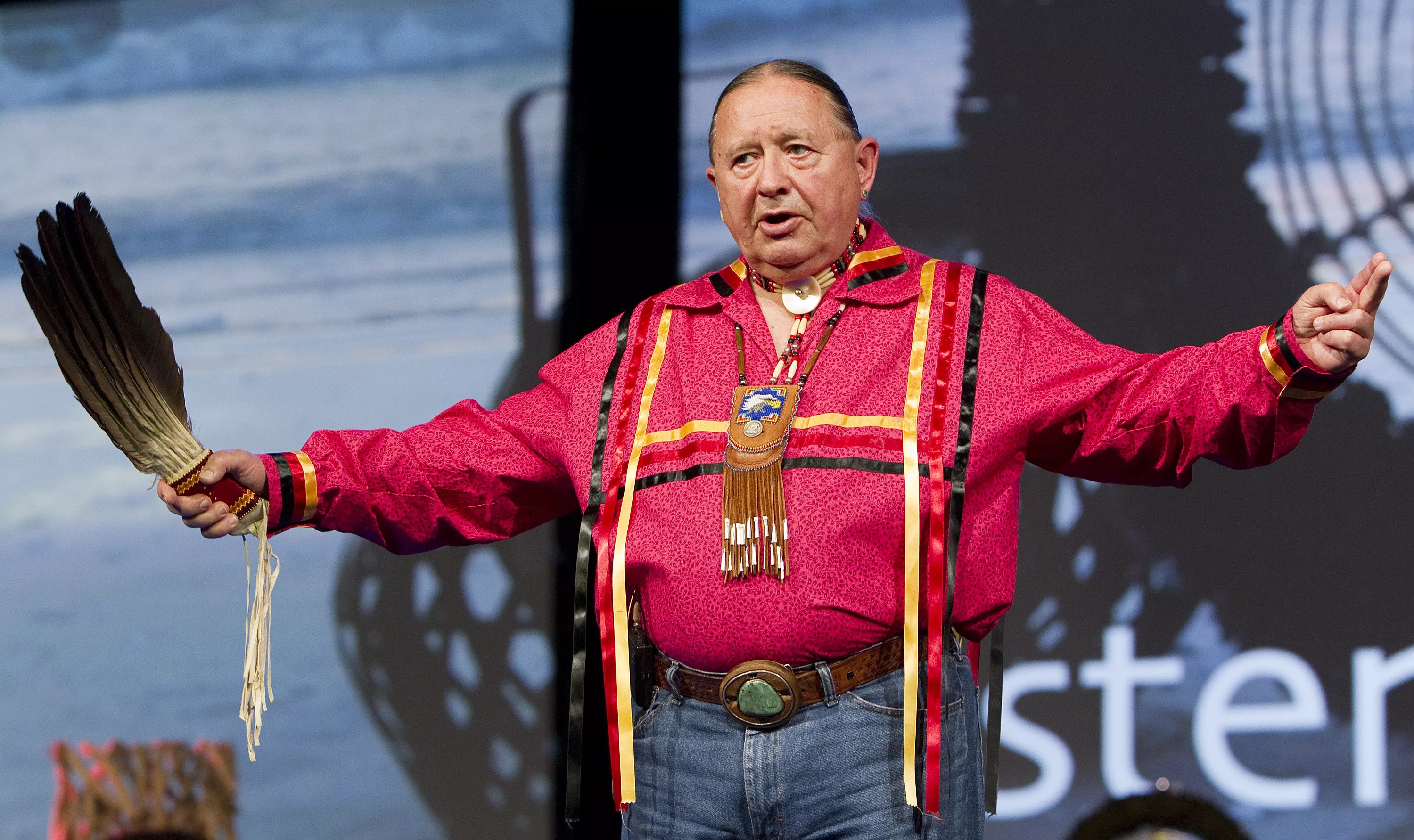
Iliff School of Theology

Audio By Carbonatix
In 1893, Iliff School of Theology was gifted a book of Christian history bound in the flayed skin of a murdered Lenape man. It was on display from 1893 to 1974. Now, through the scholarly efforts of Tink Tinker (wazhazhe, Osage Nation), who recently retired from Iliff after a 35-year career, the initial murder has been traced to the area known as West Virginia. The Quaker murderer, David Morgan, proudly documented his Indian killing in his family Bible and used the skin trophy as a cover to bind a copy of Johann Lorenz von Mosheim’s 1752 work in Latin, Institutionum Historiae Christianae Compendium, or A Compendium for Christian Institutions. Now the Iliff institution is trying to deal with its part in such gruesome history.

Jayde Tinker
As Tinker’s work details across two published essays, the book was a family treasure that eventually made its way into Methodist circuit-riding. It was and remains an object of power with rhetorical aura, symbolizing spiritual and material conquest and Indian genocide. Early Portuguese slave traders gave the name “fetiço” to such crafted objects, from which anglophones get the word “fetish.” The book was proudly displayed in the institution’s library. As late as the 1930s, a newspaper reporter for the Rocky Mountain News, admiring the smoothness of the book cover, wrote of it as a “priceless vestment for the teachings of brotherly love.” In other words, dead Indians ritually clothe eurochristian education with “brotherly love.”
After student complaints, the book was removed from display in the early 1970s. The public culture in the U.S. had begun to do some reflecting on colonialism in open criticism of the Vietnam War, but American exceptionalism remains a powerful tool for denying the genocide of American Indians. As legal scholars have pointed out, the framing of the U.S. Constitution and the agreement to have a standing federal army rested on the perceived threats of Indians to eurochristian colonizers. Denial and minimization were the intention of the Iliff administrators, who, after removing the book from display, repatriated the cover to members of the Colorado American Indian Movement under the conditions of secrecy and a nondisclosure agreement.
Secrets have a way of surfacing. Reverend Dr. Tom Wolfe, the current president of Iliff School of Theology, was aware of the secrecy surrounding the book when he began his appointment in 2013. Relying on Tinker’s research and teaching, Wolfe and the Iliff staff are addressing the institution’s past with transparency and relationship-building with Native communities. In Wolfe’s words, the institution will abide by advice of the American Indian community who have stressed the motto, “No decisions about us without us.”
Focused attention to the Iliff book reveals the embeddedness of colonialism in institutions of power and education that cannot be separated from religious colonization by convenient narratives of secularization. Between the 1970s and 2013, a lore had developed over almost forty years of secrecy. Some had heard it was a Bible bound in the skin of a Native person. Some Native people refused to visit the Iliff campus. One can only imagine the sense of isolation that Tink Tinker must have had as a young wazhazhe/Osage scholar who joined the faculty in 1985. No one told him about the book when he was hired. A conscientious colleague finally pulled him aside one day to tell him about it.
Tinker’s efforts serving the Four Winds American Indian Council in Denver for 25 years finally convinced the local Lutheran synod to return the land of one of its churches to the Native community, which is now designated as a “liberated zone” for Native people. Amid so much lofty rhetoric around current land acknowledgments for various Nations, these efforts have at least had the tangible effect of contributing to LandBack movements.
Now, in late April 2022, a delegation of Lenape elders coordinated by Curtis Zunigha (Lenape/Delaware) will meet in person at the theology school to address the question of what to do with the book. Tinker reached out to the Lenape community, but only after years of educating largely non-Natives at Iliff through various conferences that have invited Indigenous people to the campus to address the genocidal erasure of American Indians.
For years, Tinker worked amid colleagues resistant to his teaching amid the shroud of institutional secrecy around the book. All the while, with encouragement from esteemed colleagues such as Vincent Harding, Tinker was educating students with classes such as “Christianity and American Indian Genocide,” which I was fortunate to take with him during his last year teaching full-time in 2015. He tells me it took decades of rigorous thought and decolonizing his own mind to get to the place where he could voice the scholarship around the atrocity in Red Skin, Tanned Hide: A Book of Christian History Bound in the Flayed Skin of an American Indian. As he regularly says today, he is still in the process of decolonizing his own mind from eurochristian myths. So am I.

Tink Tinker learned of the book only after he joined the faculty at Iiff.
Iliff.edu
As I have learned from Tink Tinker, decolonizing is a process that looks different for different people with different backgrounds. As Tinker’s more recent work has emphasized, along with that of Indigenous scholars such as Steven Newcomb (Shawnee/Lenape) and Barbara Alice Mann (OnÁ¶ndowa’ga:’/Seneca), respective worldviews run deeper than overt expressions of ideology, identity and belief. Worldview is informed by both one’s cognitive conditioning from infancy and the inherited dispositions and cultural memory of the group in which one is raised. One of Tinker’s former students, Mark Freeland (Sault St. Marie Anishinabek) has recently written Aazheyaadizi, a nuanced book on worldview and logics of decolonization.
Public rhetoric can be reflective of ideology, culture and religion, but worldview persists beneath such labels. American public rhetoric today is often framed on a Black-White binary, which produces word-glosses such as the frequently used BIPOC (Black, Indigenous, People of Color). One ongoing problem of such a binary with respect to Indigenous people is that it situates the issue only according to the inventions of race that eurochristian colonizers invented as a means to subordinate others during early colonialism.
The invention of “Whiteness” was produced historically by legal and cognitive efforts entirely entrenched in a context where religion and politics could in no way be separated from one another. Hence, Tinker insists on using the lower-cased term “eurochristian” to signify a social movement and not a religion. Understanding this requires critiquing myths of secularization and hypocritical approaches to a separation of church and state.
Modern racism is but one tool of colonialism, and now that such a tool is no longer effective in its earlier ways, some people want to “move beyond” it without accounting for ongoing or past intergenerational inequity. Hence we get the red herrings of “All Lives Matter” or “Blue Lives Matter” as a way to avoid the issues raised by the Movement for Black Lives. Others – and many well-intentioned “liberals” among them – adopt a politics of recognition that covertly perpetuates colonialism through rhetoric of inclusion, as Glen Sean Coulthard (Yellow Knives Dene) has detailed in Red Skin, White Masks, an echoing of Frantz Fanon’s classic, Black Skin, White Masks. Public rhetoric that situates itself on a Black-White binary ignores the very different situations Black and Indigenous peoples have historically faced against the same oppressor. Public claims to secularization also de-emphasize the entrenchment of religious attitudes in our founding documents and institutions. Colonizers have short memories, as our immigration debates attest.
These issues are especially present in institutions of education. As Mark Freeland recently stated in a talk at the University of Colorado Denver, why would Indigenous people want to simply be “included” in well-intentioned educational programming amid the intentional genocide promoted by religious education and forced boarding schools? In what warped mentality would state schools be “safe spaces” for people who are erased by the curriculum? Our nationalist public rhetoric in the U.S. continues to celebrate the recent inclusion of undoubtedly remarkable women such as Kamala Harris, Deb Haaland and Ketanji Brown Jackson without any attention to the 1823 Johnson v. M’Intosh decision’s claims that the United States owes its claims to legitimacy according to the Doctrine of Christian Discovery. Most of our public, as my university students exhibit daily, have never heard of the Doctrine of Discovery or been taught about Indigenous life on Turtle Island growing up.
The aspirations for Indigenous people seeking to maintain nationhood against genocidal erasure go unheard amid a louder public rhetoric celebrating the “inclusion” of historically marginalized voices without due diligence to acknowledging past genocide. Such aspirations have not historically included citizenship or voting rights with an entity that has never kept any treaty promises. Certainly, there have been moments of unity amid various groups oppressed by eurochristian colonialism. Certainly, some Christian groups have disavowed the legacy of the Doctrine of Discovery, but the broader Christian fervor loudly fusing with current right-wing politics today is entrenched within a long history of eurochristian colonialism and a rhetoric of “civilization.” The larger public discourse in the U.S. has yet to turn its attention on race and white privilege to the eurochristian colonizing motivations that underwrite our modern concepts of race.
Attempts to genocidally erase Native Americans have been historically complemented by a pendulum swinging between policies of outright extermination and the politics of recognition and assimilation. For example, one’s 23andme DNA report alone cannot say much about their worldview. As scholars such as Ward Churchill and David Stannard have long shown, blood quantum percentages were actively genocidal policies imposed by the U.S. government on American Indians according to pseudoscience of the nineteenth century. But now they have become normalized in identity claims and the industry of “family heritage.” What conception of relationships does the term “family” connote in this context?
That said, emergent research around intergenerational trauma from groups subjected to genocide, like a worldview analysis, suggests that groups affected by genocide do indeed pass along cultural memory. Yet we in the broader U.S. culture can easily point the finger at authoritarian figures like Hitler and Putin while minimizing, erasing and denying the same deeply entrenched impulses – even while proclaiming our love for an entirely abstract and irresponsible notion of “freedom” that sets us apart from the rest of the world. The global shift to the right, as François Cusset has tracked, has our broader public entertaining oppressors, racists and those complicit in genocide as “just another point of view,” whether we are in France or the U.S.
Every day, we are reading about Russia’s invasion of Ukraine. We see genocidal actions as they are occurring, even while most Americans conveniently deny or remain ignorant about this land and its people. Raphael Lemkin coined the term “genocide” in the 1940s to address an ancient crime. It was a rhetorical act to promote awareness. We currently lack the critical skills in our public discourse, because we have inherited a culture of denial and minimization that can vilify past authoritarian political figures of whom our youth have little memory.
Now is the time to do the work of reflecting on colonial genocide at the broader level, and with the support and efforts that teachers like Tink Tinker have given us. Now is the time to see what connects what a small group of Lenape elders has to say about a resonating atrocity affecting one of their relatives with the politics of a globe in a crisis of politics, economics and values. The work is not the effort of one group or one article or book, but an attention to relations of asymmetrical power and imbalance. The work is deeper than race,
nation, ideology, religion or culture. The work is a shift in worldview that sees relations and not exceptions.
Dr. Roger K. Green hold Ph.D.s in Rhetoric & Theory and Religious Studies. He teaches English and Religious Studies at MSU Denver and the University of Denver. He has recently initiated the Center for Critical & Cultural Theory of Denver to promote public engagement with themes such as those discussed above.
On weekends, Westword frequently publishes op-eds and essays on matters of interest to the community; the opinions are those of the authors, not Westword. Have one you’d like to submit? Send it to editorial@westword.com, where you can also comment on this piece.